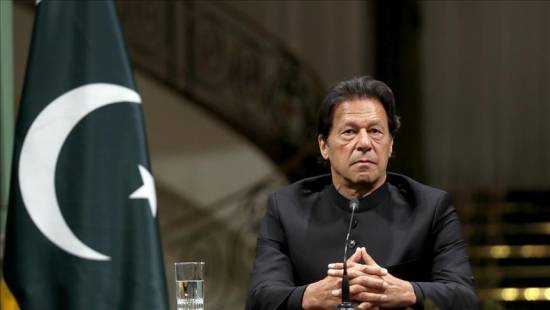
Following a month of protests, Pakistan's premier on Sunday ordered "strong" steps against illegal fishing off the coast of Gwadar, a key route of the multibillion-dollar China Pakistan Economic Corridor (CPEC).
Tens of thousands of fishermen and locals have been on the streets demanding a ban on illegal fishing, the removal of security checkpoints from within the city, and action against drug smuggling and wine shops.
"I have taken notice of the very legitimate demands of the hardworking fishermen of Gwadar. Will be taking strong action against illegal fishing by trawlers and will also speak to CM (Chief Minister) Balochistan," Prime Minister Imran Khan said in a much-awaited announcement on Twitter.
The local fishermen accuse Chinese fishing companies of being involved in illegal fishing, which they say has deprived them of their only source of income.
With its 600-kilometer (373-mile) coastline, Gwadar is a key deep seaport currently operated by China, which seeks to gain direct access to the Indian Ocean via Gwadar in line with its $64 billion CPEC mega-project.
The economic corridor is hoped to provide China cheaper access to Africa and the Middle East and also earn Pakistan billions of dollars to provide transit facilities to the world’s second-largest economy.
Many, nonetheless, complain that locals have benefited little from the project.
The government of the southwestern Balochistan province, of which Gwadar is a district, says that the protesters' four major demands, including the closure of wine shops and removal of the "additional" security checkpoints, have been met.
Islamabad, for its part, has recently announced several solar power and potable water projects for Gwadar, an otherwise less-developed district of the southwestern Balochistan province, which borders both Afghanistan and Iran.
Fisherman leads protests
Maulana Hidaytullah, a leader of Jamat-e-Islami, the country's mainstream religious party, has been leading the mammoth protests for the last 28 days.
The son of a fisherman hit the limelight a few months ago when his message on social media platforms "I’m coming this evening. Are you too?" went viral, prompting thousands of locals to take part in a protest rally, which is viewed as the starting point of the ongoing movement.
His party has never been politically influential in Gwadar, but his popular stand has put him at the center of the region's politics.
Contrary to centuries of local traditions, thousands of women attended a rally to support Baloch in Gwadar last week.
The large Balochistan province, which is also considered to cover parts of neighboring Iran and Afghanistan, is strategically important due to its rich copper, zinc, and natural gas reserves.
The province has long witnessed a low-intensity separatist movement, with Baloch separatists claiming the region had been "illegally" incorporated into Pakistan in 1947, following the end of the British colonial era.
Fisherman leads protests
Maulana Hidaytullah, a leader of Jamat-e-Islami, the country's mainstream religious party, has been leading the mammoth protests for the last 28 days.
The son of a fisherman hit the limelight a few months ago when his message on social media platforms "I’m coming this evening. Are you too?" went viral, prompting thousands of locals to take part in a protest rally, which is viewed as the starting point of the ongoing movement.
His party has never been politically influential in Gwadar, but his popular stand has put him at the center of the region's politics.
Contrary to centuries of local traditions, thousands of women attended a rally to support Baloch in Gwadar last week.
The large Balochistan province, which is also considered to cover parts of neighboring Iran and Afghanistan, is strategically important due to its rich copper, zinc, and natural gas reserves.
The province has long witnessed a low-intensity separatist movement, with Baloch separatists claiming the region had been "illegally" incorporated into Pakistan in 1947, following the end of the British colonial era./aa


